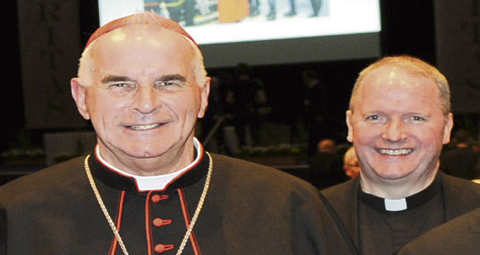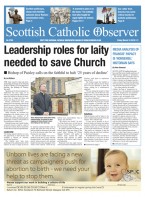BY Ian Dunn | June 29 | ![]() 0 COMMENTS
0 COMMENTS ![]() print
print

The people behind Europe’s bishops will learn from each other in capital
— Mgr Paul Conroy, the Bishops’ Conference of Scotland’s general secretary, tells IAN DUNN what is in store for the delegates at this weekend’s AGM in Edinburgh of the general secretaries of the Council of European Bishops’ Conferences
This weekend will see some of Europe’s most influential Catholics gather in Edinburgh to discuss the future of the continent in a time of collapsing banks and emptier churches.
The 40th annual meeting of the general secretaries of the Council of European Bishops’ Conferences at Dynamic Earth in Edinburgh will bring together the people behind the continent’s bishops, the gatekeepers to the leaders of the Church from the Atlantic to the Urals to hear speakers including Professor John Haldane and Mgr Ronnie Jenkins, general secretary of the US Conference of Catholic Bishops.
For the Bishops’ Conference of Scotland’s General Secretary Mgr Paul Conroy it will the culmination of a year of work and a unique opportunity.
“I think a lot of the news we have seen about Europe lately has been about financial crisis and so on,” he said. “And some of the things we will be exploring at this conference are ways of being European that are not just economic but are about other things, such as life, dignity and all the different connections that bring us together.”
For all the bad news coming out of Europe lately, Mgr Conroy is very aware that in many ways Europe remains far safer and healthier than in the recent past.
“There will be people at this conference that personally experienced the persecution of the Church under Communism,” he said. “There are bishops there who were imprisoned and you can go to these countries and see the shrines for people who died for their faith.”
Though he says it is ‘very fortunate’ that Europe has moved past Communism, the new challenge for the Church, that of secularism, will be a key focus of the conference.
New Evangelisation
The official theme of this weekend’s conference will be the interface between the Church and politics particularly in relation to the New Evangelisation.
“If the delegates take one thing away from this conference, I hope it will be the sense that the Church needs to be a bridge to the world,” he said. “It can’t be an island, it needs to reach out into the world and use the wisdom of the Church’s teaching for the good of the world.”
The general secretaries who are coming to Edinburgh to hear that message are not always what you would expect.
“The assumption would be it is an ordained person but that is not essential,” Mgr Conroy said. “Almost all the general secretaries are priests or bishops but not always.
“One of the Scandinavian general secretaries is a lay sister, in Cyprus it is a lady who is also the press officer, in the Netherlands and Switzerland it is laymen and the assistant general secretary in Hungary is a married priest in the Greek rite so there is quite a bit of variety.”
Communication
Whatever their background, Mgr Conroy has also noted that a gift for languages is an increasingly important gift in the role of general secretary.
“It helps to have a couple of languages,” he said. “Italian is becoming more and more important as lot of Vatican documents are now in Italian. English too is quite commonly used and there is an assumption now that church business will be conducted in English if not Italian.”
One reason for the increasing importance of English in the international Church is that that Latin is not as widely spoken as some might assume.
“You would think that Latin would still be an essential part of Church administration but in a number of the Eastern European countries, the Church still has a Greek rite so Latin does not even have a liturgical role,” Mgr Conroy said.
Among the other key qualities Mgr Conroy highlighted for a good general secretary is that a ‘good grasp of technology’ is ‘increasingly important.’
“It is quite common to see people fiddling with iPads at the conferences now,” he added.
He also stressed the need for a strong ‘administrative awareness’ and said a ‘number have background in Canon law.
“I do not but you have to be conversant with how it operates within the Church,” he said.
In addition, he believes it is good to have a ‘sense not only of your local church but also the broader church, what’s going on in the Vatican and how that works as well.’
Common ground
Despite the need for this broad skill set, he believes the job is ‘surprisingly similar’ from country to country.
“You do find it scales up and down,” he said. “In Italy, Poland and Spain, the general secretary tends to be a bishop just because of the number of people they have working for them and the scale of the projects they work on.”
Though there is an extremely busy agenda planned for the three-day conference, Mgr Conroy says he hopes that the visitors get to take away a little bit of a sense of Scotland’s Christian history with them.
“I think it is a surprise for people from outside when you tell them St Ninian was here in the 4th century,” he said. “It is one of those surprising things that there wasn’t really a strong Christian identity in central Europe at the end of the first millennium and the Celtic monks went back into Europe and re-evangelised it.”
This ancient legacy is one he believes can have a special legacy in this time of the New Evangelisation.
“I would hope they enjoy visiting Scotland,” he said. “But also that they go away with a sense of that Christian Catholic identity that has been part of the warp and waft of Scotland for many, many centuries.”
Pic by Paul McSherry: Cardinal Keith O’Brien and Mgr Paul Conroy











